Liu Wei Di Huang Wan (Six Flavor Teapills or Six Flavor Rehmannia) is a traditional Chinese formula originally created as a gentle and gradual way of building up the strength and vitality of infants and children with what we might now call (generally speaking) developmental delay issues (e.g. failure to thrive, fontanels not closing, and delays in standing, walking, speech, and dental development).
While it is still used in clinically in this capacity, in modern times its range of use has expanded into use as a foundational formula for addressing a wide variety of complaints rooted in Kidney yin deficiency to include:
- lower back ache/achy behind the knees
- night sweats
- adrenal fatigue
- hyperthyroidism
- tinnitus/diminished hearing
- dizziness/vertigo
- blood sugar regulation/support for diabetes (“xiao ke” syndrome)
- side effects of chemotherapy
- other subjective heat signs (dry eyes/throat, malar flush, 5-center heat)
What does Kidney Yin Deficiency “look like”?
Kidney yin deficiency is a state of disharmony in which the body’s cooling, nourishing fluids (i.e. Kidney Yin) have been depleted, especially when this depletion has its roots in chronic overwork/stress—as when, perhaps, one leads a busy lifestyle of long days of working at a stressful job, driving kids around to activities and eating processed/prepared food on the run… or perhaps one might work the night shift as a hospital nurse, come home exhausted with an achy back and knees and yet have trouble falling asleep… or think of a person who goes to the gym for a couple of hours every day while also working and raising a family… or perhaps someone who likes to stay up late drinking and partying… these are all examples of lifestyles that, over time, might lead the body to manifest the symptomology of Kidney yin deficiency.
In the clinic itself, the two primary symptoms of Kidney yin deficiency are: (1) soreness in the lower back and knees and (2) night sweats. Other common indicators include dizziness, tinnitus, and vertigo as well as other heat signs (such as hot palms & soles (5-center heat), malar flush, dry mouth, and/or chronic dry/sore throat). The tongue will likely be red with little or no coating and the pulse rapid & thin.
Exploring the dynamics among the herbs comprising Six Flavor Rehmannia
Liu Wei Di Huang Wan is comprised of six herbs: Shu Di Huang (Prepared Rehmannia root), Shan Zhu Yu (Cornus fruit), Shan Yao (Chinese dioscorea (yam)), Ze Xie (Alisma- water plantain rhizome), Mu Dan Pi (Moutan cortex), Fu Ling (Poria). These six herbs synergistically combine in a number of ways to aid the body in restoring balance. Some of these relationships are noted below:
Three tonic, warming herbs are paired with three draining, cooling herbs to achieve a gentle and balanced approach to rebuilding the depleted energy reserves of the Kidney system.
Tonic, Warming Herbs
- Shu Di Huang: warms and nourishes the kidney
- Shan Zhu Yu: warms and nourishes the Liver
- Shan Yao: Warms and nourishes the Spleen
Draining, Cooling Herbs
- Ze Xie: Cools the kidneys and drains moisture
- Mu Dan Pi: Cools the Liver and moves Blood
- Fu Ling: Drains excess dampness and phlegm from Spleen
Shu Di Huang is referred to in the Chinese Medica as being “greasy & cloying”, that is, difficult to digest; Shan Yao and Fu Ling help the body to extract nutrients and healing components from this difficult to process herb.
Additionally, Shan Yao and Fu Ling aid the body in more effectively extracting nutrients from food in general (i.e. they tonify Spleen Qi). This has the function of nourishing Liver blood by providing better building blocks for its manufacture, which in turn improves Liver function (Liver blood and Kidney yin are closely related, another topic for another article!).
Shan Zhu Yu + Mu Dan Pi + enriched (Liver) blood also improve Liver function (without which Kidney yin deficiency cannot be effectively addressed).
Shu Di Huang + Ze Xie: These two herbs combine to normalize Kidney function (especially regarding water cycle/elimination); furthermore they combine to tonify Kidney yin and post-natal Kidney essence. This post-natal Kidney essence provides the basis for the body to make Qi, which in turn drives all functions of the body.
Shan Zhu Yu and Shan Yao are both astringent and help to prevent leakage of Kidney yin and post-natal Essence once it is manufactured.
Formulas based on Liu Wei Di Huang Wan
Liu Wei Di Huang Wan/Six Flavor Rehmannia is commonly considered to be a base formula for treating Kidney yin deficiency; however, there are many other formulas which add herbs to this base formula to address symptoms that can arise in addition to the basic symptoms of Kidney Yin deficiency. Five of these formulas will be discussed below.
Zhi Bai Di Huang Wan
Zhi Bai Di Huang Wan: Zhi Bai Di Huang Wan is also known by its English name: Eight Flavor Rehmannia. It comprises the six herbs in Liu Wei Di Huang Wan with the addition of two herbs that clear heat: Huang Bai (Phellodendron bark) and Zhi Mu (Anemarrhena Rhizome). This formula addresses cases of chronic Kidney yin deficiency in which “the fire flares upwards”. A common application of this formula is for women experiencing the hot flashes and night sweats associated with menopause (although it should be noted that it is not just the “Menopause formula”—it is applicable for either men or women who are exhibiting Kidney yin deficiency signs coupled with strong heat signs as well).
Qi Ju Di Huang Wan
Qi Ju Di Huang Wan: This formula adds the two herbs Gou Qi Zi (Lychee fruit) and Ju Hua (Chrysanthemum flower) to the base formula for cases of Kidney yin deficiency which affect the eyes. Additional symptoms addressed by this formula are dry eyes, blurry vision, pressure behind the eyes, and poor night vision.
Ming Mu Di Huang Wan
Ming Mu Di Huang Wan: This formula builds on Qi Ju Di Huang Wan above—it starts with the six base herbs that address chronic Kidney yin deficiency, adds Gou Qi Zi and Ju Hua to address problems with vision, and then adds four more herbs to address additional heat-related symptoms such as red and itchy eyes, excessive tearing, and photophobia. Other heat related symptoms you might see in a case where this formula is appropriate (not specifically in the eye region) are tinnitus, dizziness, vertigo, and irritability/short-temper.
For the TCM student: three of the herbs added to this formula directly address Liver Yang rising (Shi Jue Ming (Abalone shell), Bai Ji Li (Tribulus), and Bai Shao (Peony flower- this herb is also said to “soften the Liver”); the fourth herb added to this formula is Dang Gui (Angelica root), which in this context tonifies and moves Blood in order to address Liver Yang rising.
Er Long Zuo Ci Wan
Er Long Zuo Ci Wan: This variation on Liu Wei Di Huang Wan adds Chai Hu (Bupleurum) and Ci Shi (Magnetite) to address Chronic Kidney yin deficiency with Liver yang rising where the symptoms manifest as tinnitus—(it should be noted that this formula will not be effective in cases where nerve damage or trauma is the cause of the ear ringing). Other symptoms that may occur alongside the ear ringing that may indicate the use of this formula are dizziness, vertigo, and headaches.
Mai Wei Di Huang Wan
Mai Wei Di Huang Wan: This formula adds the herbs Mai Men Dong (Ophiopogon) and Wu Wei Zi (Schisandra berry) to direct the formula to the lungs. It is used for such symptoms as dry cough, dry throat and dry nasal passages in chronic cases of Kidney yin deficiency in which the patient has been in a weakened state over a longer period of time (e.g. geriatric cases or someone recovering from febrile illness) and not for acute cases (e.g. catching a cold or allergy symptoms).


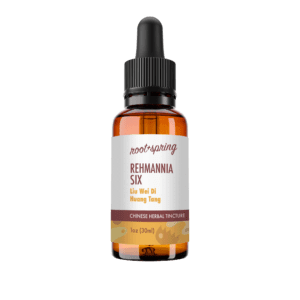 Liu Wei Di Huang Tang (Rehmannia Six) – Liquid Extract (Tincture)
Liu Wei Di Huang Tang (Rehmannia Six) – Liquid Extract (Tincture)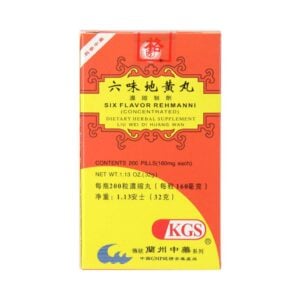 Liu Wei Di Huang Wan – Six Flavor Rehmanni – Lanzhou Traditional Herbs (KGS)
Liu Wei Di Huang Wan – Six Flavor Rehmanni – Lanzhou Traditional Herbs (KGS)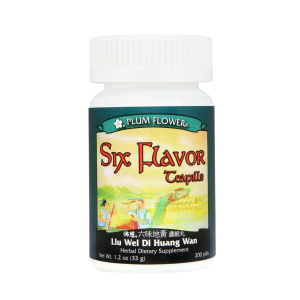 Plum Flower – Six Flavor Rehmannia (Liu Wei Di Huang Wan)
Plum Flower – Six Flavor Rehmannia (Liu Wei Di Huang Wan)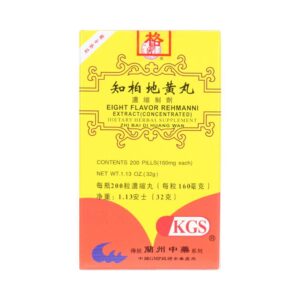 Zhi Bai Di Huang Wan – Eight Flavor Rehmannia – Lanzhou Traditional Herbs (KGS)
Zhi Bai Di Huang Wan – Eight Flavor Rehmannia – Lanzhou Traditional Herbs (KGS)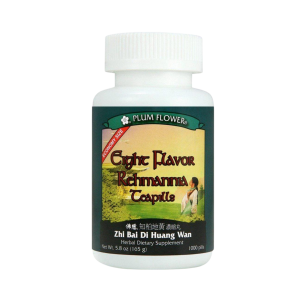 Plum Flower – Eight Flavor Rehmannia (Zhi Bai Di Huang Wan)
Plum Flower – Eight Flavor Rehmannia (Zhi Bai Di Huang Wan)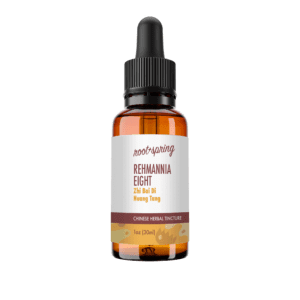 Zhi Bai Di Huang Tang (Rehmannia Eight) – Liquid Extract (Tincture)
Zhi Bai Di Huang Tang (Rehmannia Eight) – Liquid Extract (Tincture)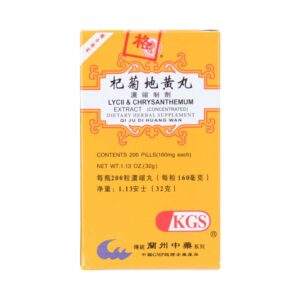 Qi Ju Di Huang Wan – Lycii And Chrysanthemum Extract – Lanzhou Traditional Herbs (KGS)
Qi Ju Di Huang Wan – Lycii And Chrysanthemum Extract – Lanzhou Traditional Herbs (KGS)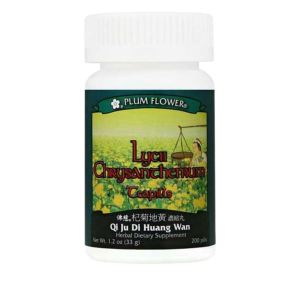 Plum Flower – Lycii Chrysanthemum Teapills (Qi Ju Di Huang Wan)
Plum Flower – Lycii Chrysanthemum Teapills (Qi Ju Di Huang Wan)
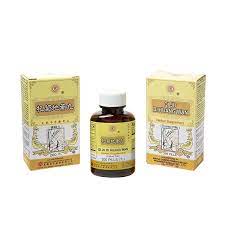 Solstice Medicines (Ci Brand) – Qi Ju Di Huang Wan
Solstice Medicines (Ci Brand) – Qi Ju Di Huang Wan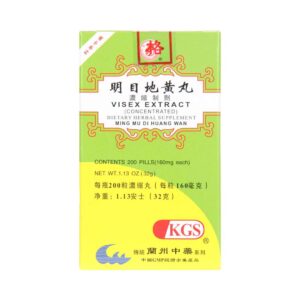 Ming Mu Di Huang Wan – Visex Extract – Lanzhou Traditional Herbs (KGS)
Ming Mu Di Huang Wan – Visex Extract – Lanzhou Traditional Herbs (KGS)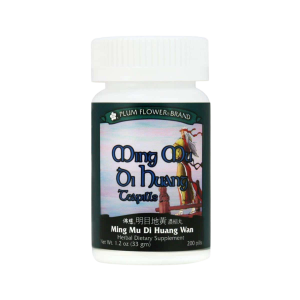 Plum Flower – Ming Mu Di Huang Wan – (OUT OF STOCK)
Plum Flower – Ming Mu Di Huang Wan – (OUT OF STOCK)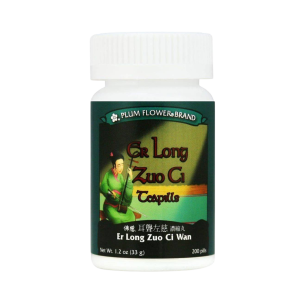 Plum Flower – Er Long Zuo Ci Wan
Plum Flower – Er Long Zuo Ci Wan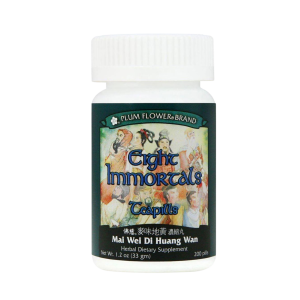 Plum Flower – Eight Immortals (Mai Wei Di Huang Wan)
Plum Flower – Eight Immortals (Mai Wei Di Huang Wan)
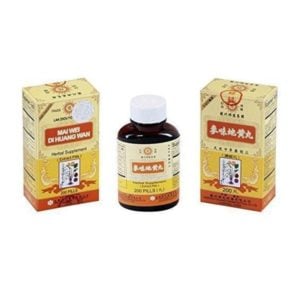 Solstice Medicines (Ci Brand) – Mai Wei Di Huang Wan
Solstice Medicines (Ci Brand) – Mai Wei Di Huang Wan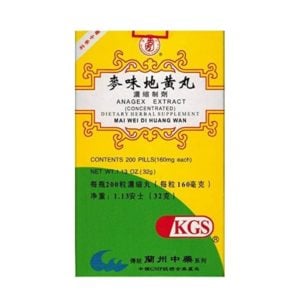 Mai Wei Di Huang Wan (Anagex Extract) – Lanzhou Traditional Herbs (KGS)
Mai Wei Di Huang Wan (Anagex Extract) – Lanzhou Traditional Herbs (KGS)